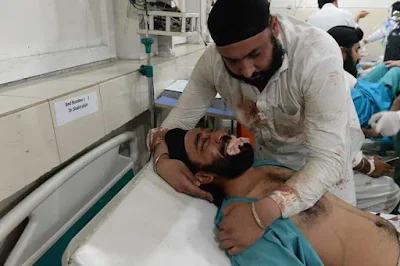A suicide bomber blew himself up in a city in eastern Afghanistan where President Ashraf Ghani was visiting, killing at least 19 people, many of them Sikhs, officials said Sunday, in the latest violence to rock the country.
The attacker struck a market located hundreds of metres from the provincial governor´s compound where Ghani was holding meetings, governor spokesman Attaullah Khogyani told AFP.
Among the 19 dead were 12 Sikhs and Hindus, he told AFP. Another 20 people were wounded.
There were scenes of anguish at the hospital where grieving relatives wept and hugged each other as they waited for news of their loved ones.
"It is over for us, we are finished, they have massacred us, at least 10 of us," a man told AFP, too upset to give his name.
Provincial health director Najibullah Kamawal confirmed 19 people had been killed, the majority of them Sikhs.
Small communities of Sikhs and Hindus reside in what is otherwise an overwhelmingly Muslim nation. It is not clear if they were the intended target of the attack.
Interior ministry spokesman Najib Danish confirmed a suicide bomber carried out the attack -- the latest in a series of recent deadly assaults in the restive province.
Ghani´s spokesman said the president was still in Nangarhar but was "away from danger".
Ghani arrived in Jalalabad earlier Sunday to open a hospital, part of a two-day visit to the province bordering Pakistan.
- Ceasfire ends -
Attahullah Khogyani, spokesman for the provincial governor, said that a number of and shops vehicles caught fire as result of the attack.
Gen. Ghulam Sanayee Stanekzai, Nangarhar’s police chief, said that the attacker targeted the group on its way to the governor’s compound. They had planned to meet with President Ashraf Ghani, who was visiting the region on Sunday.
No one immediately claimed responsibility for the attack, but the Taliban and an Islamic State affiliate are active in the province.
Sikhs and Hindus have long suffered widespread discrimination in the conservative Muslim country and been targeted by Islamic extremists. The community numbered more than 80,000 in the 1970s, but today only around 1,000 remain in the country. Under Taliban rule in the late 1990s, they were told to identify themselves by wearing yellow armbands, but the dictate was not wholly enforced. In recent years, large numbers of Sikhs and Hindus have sought asylum in India, which has a Hindu majority and a large Sikh population.
In a separate incident, at least 110 people have been hospitalized after drinking from a river in the northern Parwan province, an official said.
Abdul Khalil Farhangi, the head of the main hospital in Charakar, the provincial capital, said it was not clear what caused them to become ill. The symptoms included vomiting and headaches.
Afghanistan’s infrastructure has suffered from decades of war, and many rural communities do not have access to electricity or clean running water
Copyright 2018 The Associated Press. All rights reserved. This material may not be published, broadcast, rewritten or redistributed
The attack came a day after Ghani ordered Afghan security forces to resume offensive operations against the Taliban following the expiration of the government´s 18-day ceasefire.
The government´s unilateral truce overlapped with the Taliban´s three-day ceasefire for Eid, but the militants refused to prolong it.
The unprecedented ceasefire over the holiday capping Ramadan triggered spontaneous street celebrations involving Taliban fighters, security forces, and war-weary civilians.
But it was marred by two suicide attacks in Nangarhar that killed dozens of people and were claimed by the Islamic State group, which has a smaller but relatively potent presence in Afghanistan.
IS was not part of the ceasefire.
The attack comes as US envoy Alice Wells visits Kabul as part of efforts to ratchet up pressure on the Taliban to engage in peace talks.
The Taliban have so far ignored Ghani´s offer of peace negotiations. Instead, they have insisted on direct talks with the United States, which Washington has repeatedly refused.
Wells said that since the Afghan government and United States were willing to start talking without preconditions, the onus was now on the Taliban to respond.
"Right now it´s the Taliban leaders... who aren´t residing in Afghanistan, who are the obstacle to a negotiated political settlement," Wells said in remarks embargoed until Sunday.
Wells, who is due to hold talks in Pakistan on Monday, said Islamabad also needed to do more to squeeze the Taliban and get them to the negotiating table.
"Pakistan has an important role to play... but we have not yet seen that sustained and decisive action on the part of Islamabad," she said.
Tags:
International



